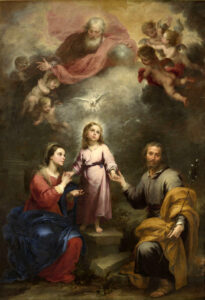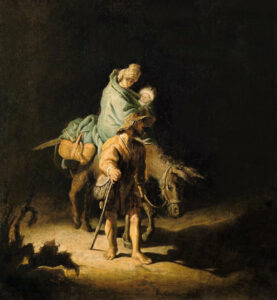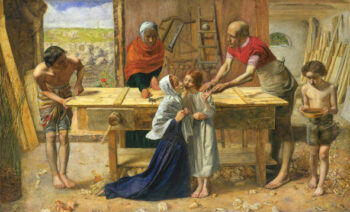Lessons for Living from St Joseph
The Man Who Raised Jesus
I have a great love for St Joseph, because he is a man of silence and strength. On my table, I have an image of St Joseph sleeping. So, when I have a problem, a difficulty, I write a little note and I put it underneath St Joseph, so that he can dream about it! In other words, I tell him: “Pray for this problem.”
– Pope Francis
St Joseph did not do extraordinary things, but rather by the constant practice of the ordinary and common virtues, he attained that sanctity which elevates him above all other saints.
– St Joseph Marello
Joseph has low visibility in the stories describing the circumstances of Jesus’ birth. Though he receives limited attention in gospel accounts, a closer examination of those few biblical references reveals a man of great courage, conviction and commitment. As a result, he is a highly regarded model for Christians who seek to aspire higher. Here are spiritual lessons for living from the life of Joseph, the husband of Mary and the foster-father of Jesus.
Joseph knew his role was to be both father and mentor
St Luke reports that “Jesus himself was about thirty years old when he began his ministry” (Luke 3:23, New International Version). Prior to those years, almost nothing is recorded about Jesus as a child and youth. Luke offers this one hint about that time: “Jesus grew in wisdom and stature and in favour with God and men” (Luke 2:52). According to Jesuit priest James Martin, “those years were Joseph’s time” with Jesus. He taught Jesus the artisan craft of woodworking. “In Joseph’s workshop in Nazareth, Jesus would have learned about the raw materials of his craft: which wood was best suited for chairs and tables, which worked best for yokes and ploughs. An experienced Joseph would have taught his apprentice the right way to drive a nail with a hammer, to drill a clean and deep hole into a plank and to level a ledge.”
Along with instructing his son in carpentry, Joseph mentored him in virtue. Fr Martin offers this additional insight: “Joseph would also have passed on to Jesus the values required to become a good carpenter: patience (for waiting until the wood is dry and ready), good judgment (for ensuring that your plumb line is straight), persistence (for sanding until the tabletop is smooth) and honesty (for charging people a fair price). Alongside his teacher, a young Jesus laboured and built, contributing all the while to the common good of Nazareth and the surrounding towns. It is not difficult to imagine that the virtues Jesus learned from his teacher -- patience, judgment, persistence and honesty -- served him well in his later ministry.”
Joseph’s parenting style is a guide for all fathers and mothers, reminding them that they are not only providing for and raising children, but they are important mentors instilling virtue and developing character. Those are the ingredients which create conditions for children to grow into adults who are resilient and resourceful, kind and compassionate.
Joseph was supportive and protective of his family

The Heavenly and Earthly Trinities, Bartolomé Esteban Perez Murillo, c. 1680
Though references to Joseph in the Bible are few, the ones recorded clearly reveal a man highly involved with his family. Joseph was not an absent father and distant husband but a quiet, steady, supportive presence. For example:
• He carefully takes Mary to Bethlehem when a census was ordered (Luke 2:1-5).
• He is devotedly at Mary’s and Jesus’ side when they are visited by shepherds and Magi (Luke 2:8-20 and Matthew 2:9-12).
• He flees with Mary and the baby Jesus to Egypt to escape the wrath of Herod and then returns to Nazareth when it was safe (Matthew 2:1-20).
• He willingly participates in the presentation of Jesus to Simeon and Anna at the Temple (Luke 2:21-40).
• He anxiously helps Mary search when Jesus is missing for three days in Jerusalem (Luke 2:41-50).

The Flight into Egypt,
Rembrandt, 1627
Joseph shows us that actions speak louder than words
Biblical scholars note that there are no recorded words of Joseph spoken in the Gospels. His name is entirely absent in Mark’s Gospel, while John’s contains only two passing references -- when Jesus is described as “the son of Joseph” (John 1:45 and 6:42). Though he plays a role in the Gospels of Matthew and Luke, he never speaks. Commenting on the silence surrounding Joseph, Mike Martinez SJ, writes: “Saint Joseph’s hidden life is his statement. He is the quintessential model of the phrase: ‘Actions speak louder than words.’ He was not worried about announcing to the world everything he did. He was not worried about leaving his public legacy... He doesn’t spend time talking about his mission. He spends his time living his mission. Joseph reminds us the real work often goes unnoticed.”
Joseph’s refugee status is a reminder that every family is a ‘holy family’
According to the United Nations Refugee Agency, 82.4 million people worldwide were forcibly displaced at the end of 2020 as a result of persecution, conflict, violence, human rights violations or other events seriously disturbing public order. Like many refugees, Joseph was forced to take his wife and infant son to safety in another country. The Gospel of Matthew (2:13-18) reports that, in a dream, an angel advises Joseph to leave his home in Palestine, taking Jesus and Mary to Egypt to escape persecution from King Herod. They flee by night, just before Herod orders the murder of all baby boys born in and around Bethlehem during the preceding two years.
The story of Joseph, Mary and Jesus as refugees is a powerful reminder that every refugee family is a ‘holy family’ entitled to protection and re-settlement.
Consider the plight of a sixteen-year-old boy named Sabri who fled his home in Aleppo, Syria. He is currently living in Paiania, Greece, and learnt recently that he and his family may be accommodated by a friendly nation. “I am staying at a guesthouse for minors and families in Paiania, just outside Athens, Greece, with my family. I’d like to go to Germany. We already know my family and I were granted permission to relocate to a German city. We are hoping to start a new page in our lives. I wish I could make people love each other – that is my dream.”
Joseph trusted a plan beyond his understanding

Christ in the House of His Parents or The Carpenter's Shop, John Everett Millais, c. 1850
Upon discovering that Mary was pregnant even though they had not been intimate, Joseph begins planning to separate from Mary. However, in a dream, an angel offers him a strange explanation for the pregnancy: “Do not be afraid to take Mary home as your wife, because what is conceived in her is from the Holy Spirit” (Matthew 1:20).
Though the message is unusual, Joseph nevertheless begins to trust that a plan beyond his understanding is emerging. St Josemaria Escriva observes that “Joseph’s faith does not falter, he obeys quickly and to the letter.” Joseph’s prompt compliance can serve as a guide for all of us whenever circumstances emerge that are confusing and unpleasant. At those times we need to recall and trust this spiritual assurance: “For I know the plans I have for you,” declares the Lord, “plans to prosper you and not to harm you, plans to give you hope and a future” (Jeremiah 29:11).
Because of Joseph’s faithfulness to his family and to God, Pope St John Paul II advocates on his behalf, reminding Christians: “St Joseph was a just man, a tireless worker, the upright guardian of those entrusted to his care. May he always guard, protect and enlighten families.”
Quick Facts about St Joseph
• Biblical scholars believe it is likely that Joseph died before Jesus's ministry began. Some speculate that he was dead before the Crucifixion, because no Gospel writers indicate that Joseph was present. This view is supported by the fact that, in the Gospel of John, Jesus entrusts the care of his mother to someone outside the family (John 19:27).
• To stress the importance of St Joseph, the Church honours him with two feast days.
• 19 March in the liturgical calendar is ‘The Solemnity of St Joseph, Spouse of The Blessed Virgin Mary.’ This date has been observed by the Church since the 10th century.
• 1 May is the second date, designated as St Joseph The Worker Day. In 1955 Pope Pius XII proclaimed this second celebration of St Joseph as a Catholic alternative to the Communist International Workers’ Day, also celebrated on 1 May.
• In 1870, Pope Pius IX declared St Joseph the patron saint of the Universal Church.
• He is also the patron saint of workers, craftsmen, fathers, travellers, unborn children, immigrants.
• Joseph is recognised as a saint by the Eastern Orthodox Churches, the Anglican Communion and by Lutherans.
The Year of St Joseph concludes on 8 December
 Entries(RSS)
Entries(RSS)